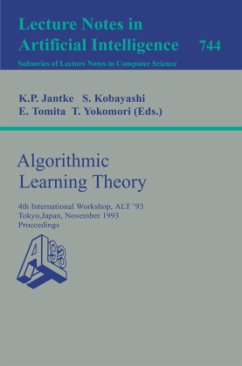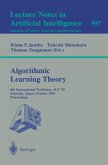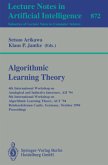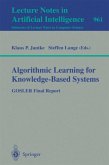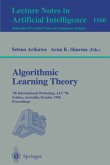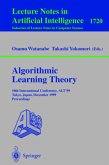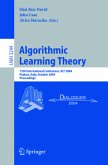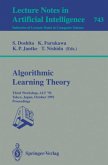Klaus P. Jantke / Shigenobu Kobayashi / Etsuji Tomita / Takashi Yokomori (eds.)4th International Workshop, ALT '93, Tokyo, Japan, November 8-10, 1993. Proceedings
Algorithmic Learning Theory
4th International Workshop, ALT '93, Tokyo, Japan, November 8-10, 1993. Proceedings
Herausgegeben:Jantke, Klaus P.; Kobayashi, Shigenobu; Tomita, Etsuji; Yokomori, Takashi
Klaus P. Jantke / Shigenobu Kobayashi / Etsuji Tomita / Takashi Yokomori (eds.)4th International Workshop, ALT '93, Tokyo, Japan, November 8-10, 1993. Proceedings
Algorithmic Learning Theory
4th International Workshop, ALT '93, Tokyo, Japan, November 8-10, 1993. Proceedings
Herausgegeben:Jantke, Klaus P.; Kobayashi, Shigenobu; Tomita, Etsuji; Yokomori, Takashi
- Broschiertes Buch
- Merkliste
- Auf die Merkliste
- Bewerten Bewerten
- Teilen
- Produkt teilen
- Produkterinnerung
- Produkterinnerung
This volume contains all the papers that were presented atthe Fourth Workshop on Algorithmic Learning Theory, held inTokyo in November 1993. In addition to 3 invited papers, 29papers were selected from 47 submitted extended abstracts.The workshop was the fourth in a series of ALT workshops,whose focus is on theories of machine learning and theapplication of such theories to real-world learningproblems. The ALT workshops have been held annually since1990, sponsored by the Japanese Society for ArtificialIntelligence. The volume is organized into parts oninductive logic and inference, inductive…mehr
Andere Kunden interessierten sich auch für
![Algorithmic Learning Theory Algorithmic Learning Theory]() Klaus P. Jantke / Takeshi Shinohara / Thomas Zeugmann (eds.)Algorithmic Learning Theory39,99 €
Klaus P. Jantke / Takeshi Shinohara / Thomas Zeugmann (eds.)Algorithmic Learning Theory39,99 €![Algorithmic Learning Theory Algorithmic Learning Theory]() Setsuo Arikawa / Klaus P. Jantke (eds.)Algorithmic Learning Theory39,99 €
Setsuo Arikawa / Klaus P. Jantke (eds.)Algorithmic Learning Theory39,99 €![Algorithmic Learning for Knowledge-Based Systems Algorithmic Learning for Knowledge-Based Systems]() Algorithmic Learning for Knowledge-Based Systems39,99 €
Algorithmic Learning for Knowledge-Based Systems39,99 €![Algorithmic Learning Theory Algorithmic Learning Theory]() Setsuo Arikawa / Arun K. Sharma (eds.)Algorithmic Learning Theory39,99 €
Setsuo Arikawa / Arun K. Sharma (eds.)Algorithmic Learning Theory39,99 €![Algorithmic Learning Theory Algorithmic Learning Theory]() Osamu Watanabe / Takashi Yokomori (eds.)Algorithmic Learning Theory39,99 €
Osamu Watanabe / Takashi Yokomori (eds.)Algorithmic Learning Theory39,99 €![Algorithmic Learning Theory Algorithmic Learning Theory]() Shai Ben David / John Case / Akira Maruoka (eds.)Algorithmic Learning Theory39,99 €
Shai Ben David / John Case / Akira Maruoka (eds.)Algorithmic Learning Theory39,99 €![Algorithmic Learning Theory - ALT '92 Algorithmic Learning Theory - ALT '92]() Shuji Doshita / Koichi Furukawa / Klaus P. Jantke / Toyaki Nishida (eds.)Algorithmic Learning Theory - ALT '9239,99 €
Shuji Doshita / Koichi Furukawa / Klaus P. Jantke / Toyaki Nishida (eds.)Algorithmic Learning Theory - ALT '9239,99 €-
-
-
This volume contains all the papers that were presented atthe Fourth Workshop on Algorithmic Learning Theory, held inTokyo in November 1993. In addition to 3 invited papers, 29papers were selected from 47 submitted extended abstracts.The workshop was the fourth in a series of ALT workshops,whose focus is on theories of machine learning and theapplication of such theories to real-world learningproblems. The ALT workshops have been held annually since1990, sponsored by the Japanese Society for ArtificialIntelligence. The volume is organized into parts oninductive logic and inference, inductive inference,approximate learning, query learning, explanation-basedlearning, and new learning paradigms.
Produktdetails
- Produktdetails
- Lecture Notes in Computer Science 744
- Verlag: Springer / Springer Berlin Heidelberg / Springer, Berlin
- Artikelnr. des Verlages: 978-3-540-57370-8
- 1993.
- Seitenzahl: 444
- Erscheinungstermin: 20. Oktober 1993
- Englisch
- Abmessung: 235mm x 155mm x 24mm
- Gewicht: 568g
- ISBN-13: 9783540573708
- ISBN-10: 3540573704
- Artikelnr.: 09234241
- Herstellerkennzeichnung
- Springer-Verlag KG
- Sachsenplatz 4-6
- 1201 Wien, AT
- ProductSafety@springernature.com
- Lecture Notes in Computer Science 744
- Verlag: Springer / Springer Berlin Heidelberg / Springer, Berlin
- Artikelnr. des Verlages: 978-3-540-57370-8
- 1993.
- Seitenzahl: 444
- Erscheinungstermin: 20. Oktober 1993
- Englisch
- Abmessung: 235mm x 155mm x 24mm
- Gewicht: 568g
- ISBN-13: 9783540573708
- ISBN-10: 3540573704
- Artikelnr.: 09234241
- Herstellerkennzeichnung
- Springer-Verlag KG
- Sachsenplatz 4-6
- 1201 Wien, AT
- ProductSafety@springernature.com
Identifying and using patterns in sequential data.- Learning theory toward Genome Informatics.- Optimal layered learning: A PAC approach to incremental sampling.- Reformulation of explanation by linear logic toward logic for explanation.- Towards efficient inductive synthesis of expressions from input/output examples.- A typed ?-calculus for proving-by-example and bottom-up generalization procedure.- Case-based representation and learning of pattern languages.- Inductive resolution.- Generalized unification as background knowledge in learning logic programs.- Inductive inference machines that can refute hypothesis spaces.- On the duality between mechanistic learners and what it is they learn.- On aggregating teams of learning machines.- Learning with growing quality.- Use of reduction arguments in determining Popperian FIN-type learning capabilities.- Properties of language classes with finite elasticity.- Uniform characterizations of various kinds of language learning.- How to invent characterizable inference methods for regular languages.- Neural Discriminant Analysis.- A new algorithm for automatic configuration of Hidden Markov Models.- On the VC-dimension of depth four threshold circuits and the complexity of Boolean-valued functions.- On the sample complexity of consistent learning with one-sided error.- Complexity of computing Vapnik-Chervonenkis dimension.- ?-approximations of k-label spaces.- Exact learning of linear combinations of monotone terms from function value queries.- Thue systems and DNA - A learning algorithm for a subclass.- The VC-dimensions of finite automata with n states.- Unifying learning methods by colored digraphs.- A perceptual criterion for visually controlling learning.- Learning strategies using decision lists.- A decomposition basedinduction model for discovering concept clusters from databases.- Algebraic structure of some learning systems.- Induction of probabilistic rules based on rough set theory.
Identifying and using patterns in sequential data.- Learning theory toward Genome Informatics.- Optimal layered learning: A PAC approach to incremental sampling.- Reformulation of explanation by linear logic toward logic for explanation.- Towards efficient inductive synthesis of expressions from input/output examples.- A typed ?-calculus for proving-by-example and bottom-up generalization procedure.- Case-based representation and learning of pattern languages.- Inductive resolution.- Generalized unification as background knowledge in learning logic programs.- Inductive inference machines that can refute hypothesis spaces.- On the duality between mechanistic learners and what it is they learn.- On aggregating teams of learning machines.- Learning with growing quality.- Use of reduction arguments in determining Popperian FIN-type learning capabilities.- Properties of language classes with finite elasticity.- Uniform characterizations of various kinds of language learning.- How to invent characterizable inference methods for regular languages.- Neural Discriminant Analysis.- A new algorithm for automatic configuration of Hidden Markov Models.- On the VC-dimension of depth four threshold circuits and the complexity of Boolean-valued functions.- On the sample complexity of consistent learning with one-sided error.- Complexity of computing Vapnik-Chervonenkis dimension.- ?-approximations of k-label spaces.- Exact learning of linear combinations of monotone terms from function value queries.- Thue systems and DNA - A learning algorithm for a subclass.- The VC-dimensions of finite automata with n states.- Unifying learning methods by colored digraphs.- A perceptual criterion for visually controlling learning.- Learning strategies using decision lists.- A decomposition basedinduction model for discovering concept clusters from databases.- Algebraic structure of some learning systems.- Induction of probabilistic rules based on rough set theory.

